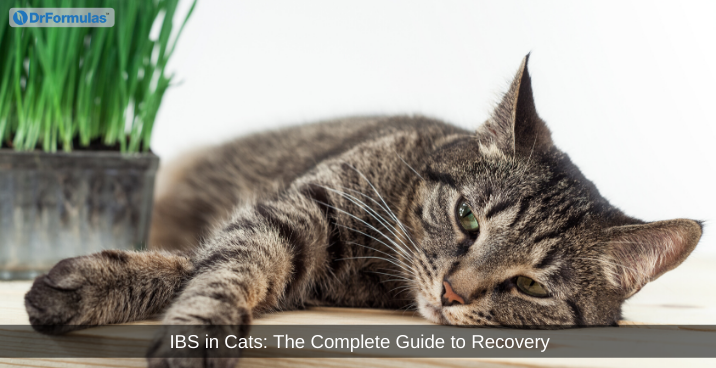
While irritable bowel syndrome is well-known in humans, it is a disease that can commonly affect cats. Similar to IBS in humans, IBS in cats is characterized by chronic inflammation and discomfort in the intestines. Cats with IBS can have both diarrhea and/or constipation. Learn more about the symptoms, treatment, and recovery for cats with IBS.
Symptoms of IBS in Cats
The exact symptoms of IBS in cats can vary. Bowel movements may be larger than normal or bowel movements may be smaller and occur more frequently.1 Other common symptoms of IBS in cats include:- Diarrhea
- Having sudden urges to defecate
- Straining to pass stools
- Constipation
- Vomiting
- Gas and bloating
- Abdominal pain, particularly when touching your cat’s abdominal area1
IBS in Cats Treatment
Part of treatment is understanding what causes IBS in cats. While the symptoms of IBS are similar to inflammatory bowel diseases, IBS is psychosomatic while IBD is inflammation caused by an underlying disease. IBS results most often from chronic mental stress, though food sensitivities or changes to diet may also contribute to IBS.21. Stress Management
Most treatments for feline IBS focus on stress management and reducing existing stressors from a cat’s life. Cats are naturally easily stressed by any changes to their usual routines, which can include meeting new people or animals, moving to another home, or traveling. Disturbances, like loud noises from construction, can also contribute to stress. Even a lack of daily stimulation can be stressful for cats. Some cats may also be more prone to separation anxiety than others.Avoiding or eliminating these stressors is not always possible, so your vet may prescribe anti-anxiety medication to help calm your cat. Calming essential oil diffusers and sprays may also help to calm your cat down, though be aware that some essential oils are not safe for cats. Increasing your cat’s activity levels, providing plenty of toys, and increasing human interaction can also help to reduce your cat’s stress.3
2. Prednisone for Cat IBS
Your vet may also recommend corticosteroids to treat inflammation, but these can come with some side effects. If you do decide to use corticosteroids, close veterinary supervision is necessary.3
3. Best Food for Cats with IBS
Along with stress management and potential medication, diet plays an important role in treating cats with IBS. This may start with a hypoallergenic food trial, which involves feeding your cat a diet composed of proteins and carbohydrates, which can include venison, duck, or rabbit. During this time, the cat should not be allowed to eat any other foods. If the problem is diet you should see improvements within a few weeks of maintaining this food trial.3
Best Canned Food for Cats with IBS:
Purina Beyond Wild Grain Free
"I and love and you" Naked Essentials Canned Wet Cat Food
4. Probiotics for Cats with IBS
Overall, cats respond best to easily digestible foods that are low in fat and high in fiber. Some vets have seen promising results with giving cats prebiotic and probiotic supplements, which may help to support a cat’s gut bacteria to aid in gastrointestinal health.3
While studies on cats are limited, there have been many promising studies in humans on the benefits of probiotics for IBS. Probiotics help reduce inflammation and irritation in the gut which may help address the underlying cause of IBS.
IBS in cats can be troubling for you and your feline, but with the right diet and some stress management, you can reduce your cat’s IBS symptoms and ensure their full recovery. Consult your veterinarian before making any changes to your cat’s diet.
Sources:
- https://www.petcarerx.com/article/irritable-bowel-syndrome-in-cats/2804
- https://www.petmd.com/cat/conditions/digestive/c_ct_irritable_bowel_syndrome
- https://wagwalking.com/cat/condition/irritable-bowel-syndrome


